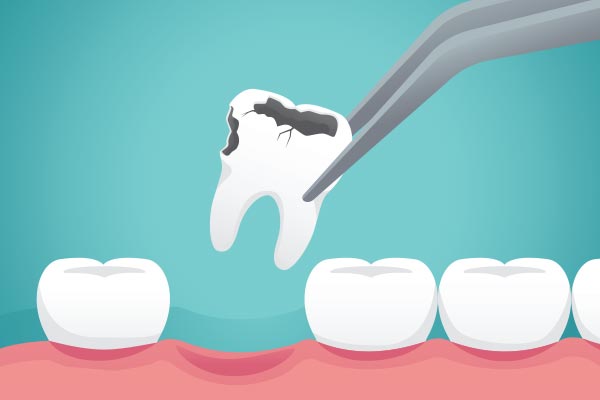Tooth extraction frequently occurs in the office of a for a variety of reasons, including:
- Bacterial decay
- Accidental breakage
- Overcrowding
- Impaction
Most patients are more concerned about the gap the tooth leaves behind than its fate outside their mouths. An extracted tooth usually takes one of the following paths, depending on whether the dentist or the patient claims it.
Reasons a dentist keeps the tooth
Incineration
A dentist usually places an extracted tooth into a sealed bio-medical bag because it retains the patient's oral tissue and blood, which are potentially infectious materials. Bio-medical waste services remove the bags from dental offices and bring them to facilities to incinerate their contents.
Recycling
If a general dentist pulls a tooth with a filling containing metal, it is necessary to send it to a recycling facility before incineration. Burning a tooth before removing the filling poses a risk of contaminating the air with mercury found in the metal. The metal can be repurposed after it is removed.
Training
Sometimes, dentists send extracted teeth to universities and other institutions where dental students and colleagues receive training. Extracted teeth can help students studying dental diseases and procedures because they present real case studies and practice models.
Research
A general dentist may want to attend seminars and take workshops to learn about new and updated techniques for patient services. By sending extracted teeth to dental laboratories and research facilities, a dentist can help ensure an adequate supply of models to test the efficacy of new procedures before they are recommended and taught.
Reasons a patient keeps the tooth
Patients may want to keep extracted teeth for various reasons. Before releasing a tooth to a patient, a dentist must thoroughly clean it to remove traces of bacteria and tissue.
Sale
Some individuals who have extracted teeth with metal fillings or gold crowns may wish to deliver them to scrap metal collectors who reuse the material. These services will reimburse individuals according to the amount of retrievable metal. Teeth containing gold crowns are particularly desirable.
Sentiment
There are many reasons why patients have sentimental attachments to extracted teeth. Although this mostly occurs with baby teeth, adults may occasionally attach a particular meaning to a tooth, making it a desirable memento.
Bragging rights
Some patients are intrigued by the removal of teeth from their mouths and want to show them to others. Impacted wisdom teeth are usually large, creating a sense of astonishment that some people feel compelled to share.
Projects
A few patients get creative with extracted teeth, using them as display objects, jewelry, or incorporating them into art projects. Although this is not an appealing route for most persons, it does happen. A general dentist must take great care to sanitize the tooth and instruct the patient about its proper handling before releasing it.
Conclusion
Tooth extraction is a standard service provided by a general dentist; however, it is considered a last resort for damaged teeth beyond repair or teeth that pose other oral health risks. Patients who want to keep extracted teeth should notify their dentist before treatment.
or call Lee Family and Cosmetic Dentistry at 662-546-1143 for an appointment in our Oxford office.
Related Posts
You can see your general dentist if you want to renew your smile. There are specific treatments that can improve your teeth and gums. At the same time, your dental functions can be better as well. Here are the cosmetic dental services that your general dentist can provide.Crooked teeth can distort one’s smile. This problem…
Talking to your general dentist about your dental anxiety can help start your dental appointment the right way. This condition can prevent you from getting the right dental treatments. Keeping it at bay is possible during the visit. Here are the details on how your general dentist can help relieve your dental anxiety.This is an…
General dentists' primary aim is to ensure optimal oral health, meaning the entire mouth. Therefore, they recommend various services to ensure the longevity of your natural teeth and surrounding structures. Take a look at the five preventative services we offer.Routine evaluations are recommended for all individuals, regardless of age. The American Dental Association, or ADA,…
